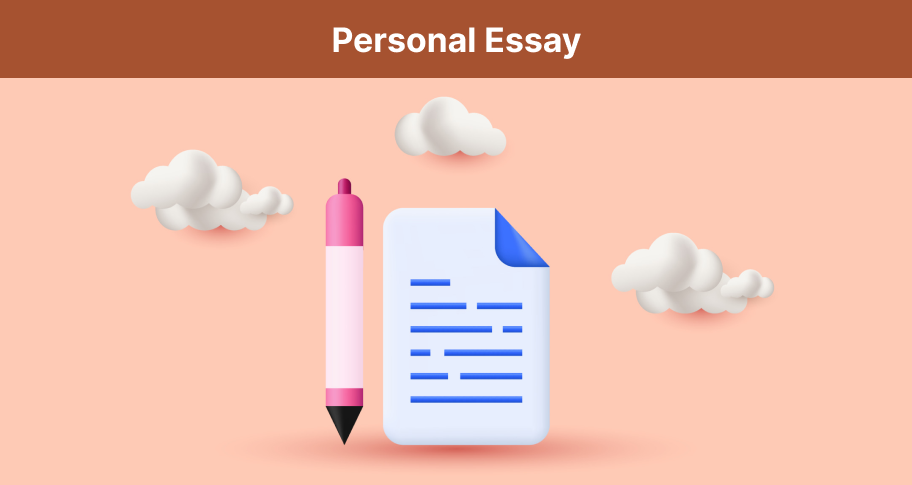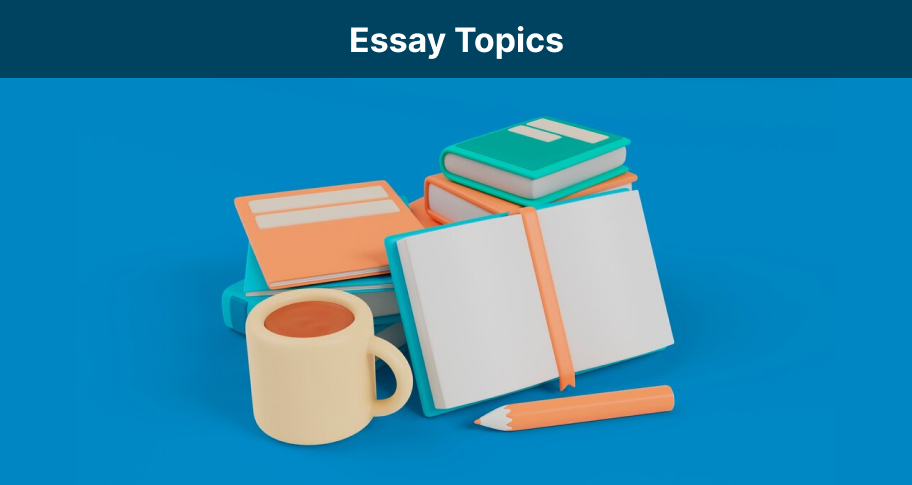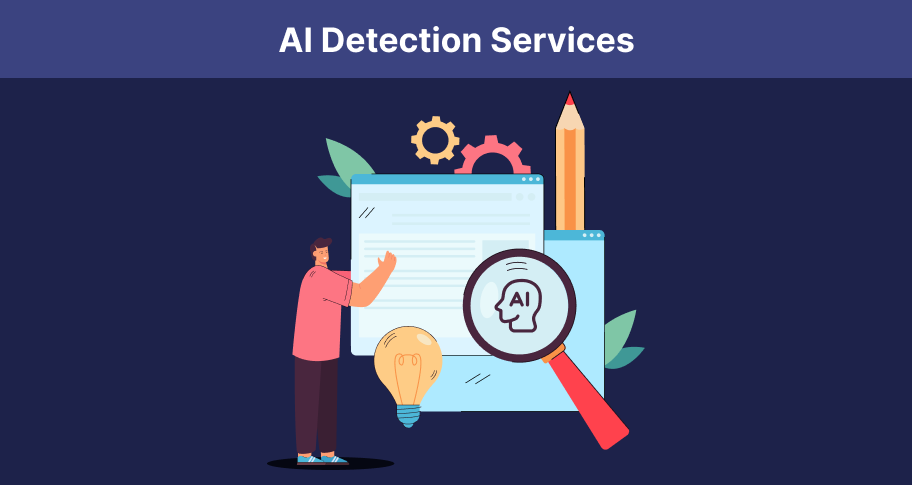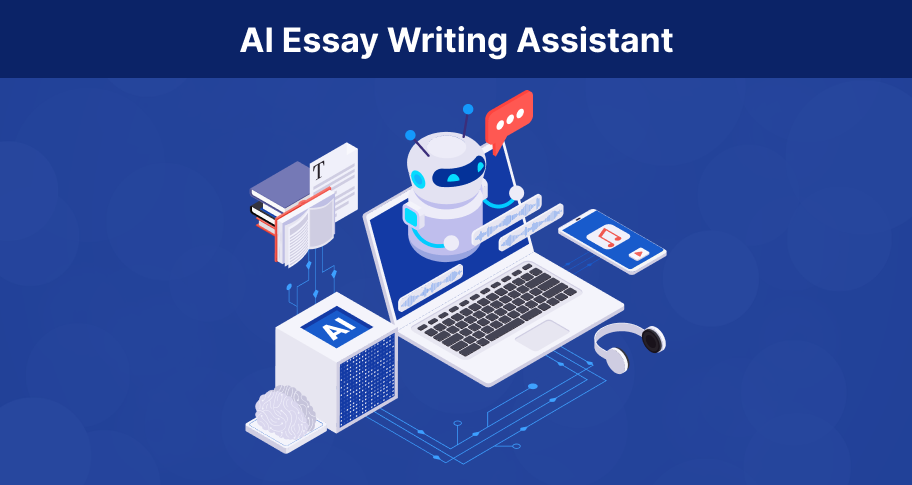Introduction
A personal essay is a short piece of writing that reflects the author’s personal experiences, thoughts, feelings, memories or sensations—usually with a unifying or deeper theme or purpose. It is like personal narrative in which the writer is given the freedom to explore his own inner world while also connecting with readers on a meaningful level. Personal essays are most frequently used for college applications, where applicants share their life stories to illustrate a finer point. They are often seen in creative writing courses, where writers allow their voice to shine.
Understanding the personal essay genre is beneficial because of how it can improve self-expression and develop one’s ability to communicate. Mastering the art of personal essay writing can empower you to articulate your stories and experiences, your thoughts and feelings, in a way that will resonate with others. Ever heard of Dale Carnegie or How to Win Friends and Influence People? Well, therein is a perfect example of how far one can get when mastering the personal essay. All in all, personal essay writing is a great way for self-discovery and self-development.
What is a Personal Essay? (Definition & Purpose)
The Definition of a Personal Essay
A personal essay is a short, non-fiction narrative essay that is entirely written from the writer’s point of view. That means it’s okay to use the “I” or first-person perspective. It is the one type of essay writing in which the author can simply use his own thoughts and experiences as reference point.
Unlike academic or technical essays, personal essays are very flexible in terms of structure and tone. They may take a storytelling approach—or they may be even more creative by adopting a poetic tone and dreamlike structure. There is really no right or wrong way to do it. The defining characteristic of a personal essay is simply its intimate, conversational voice, which lets the reader glimpse into the writer’s mind and personal life. It is like a sit-down with the author.
Thus, at its core, a personal essay is a platform for self-expression. The writer gets to reflect on and explore memories, challenges, defining moments, or comment on anything by looking at it from his own personal POV. Usually, the writer can give insights or lessons learned along the way—and good essayists like Stephen King do this well. That is why personal essays have the power to transcend mere storytelling; they can be a way to experience personal growth indirectly or vicariously. The essay can be a humorous anecdote or a heartfelt reflection, or a strong and visceral condemnation. It can be anything—so long as it is an authentic representation of the writer’s own mind and heart.
Why Personal Essays Matter
Personal essays are used in a range of situations. You will write them for college applications. You will find them on blogs. People publish their memoirs, which are basically like long personal essays. They are common in creative writing workshops. They are great because they get the writing and critical thinking juices flowing.
In college applications, for example, applicants are often asked to write short personal essays that demonstrate some aspect of their personalities, voice, values, perspective, or experiences. A good personal essay could even end up being the difference between acceptance and rejection.
On blogs, personal essays are ways for authors to share relatable stories and anecdotes that connect to other readers’ lives somehow—and, thus, bloggers win followers and fans.
In creative writing, personal essays are valued for their ability to blend narrative with introspection. It is a form that encourages experimentation with voice and form.
Memoirs often consist of interconnected personal essays, stitched together to form a kind of patchwork quilt of personal reflections.
Overall, the emotional impact of a personal essay lies in its authenticity. The more authentic it is, the more cathartic it can be.
When authors make themselves vulnerable by sharing honest thoughts and perspectives, they invite readers into their soul to see the world through the writer’s eyes. It is unlike any other type of connectivity—nothing matches it: not drama, not technical writing, not even familiar correspondence. This connection created by the personal essay (because it is structured and refined) can spark empathy, understanding, inspiration and change.
View 120,000+ High Quality Essay Examples
Learn-by-example to improve your academic writing
How to Structure a Personal Essay
Typical Personal Essay Format
The structure of a personal essay is open and flexible. That means it can be set up almost any which way. However, a traditional approach offers the most compelling structure, as it consists of an introduction, body, and conclusion. The essay introduction sets the tone and presents the main theme, the body develops the narrative with ample reflections, and the conclusion wraps up the essay with a final reflection or takeaway. It’s a good, solid approach.
Crafting an Engaging Introduction
The introduction of a personal essay should capture the reader’s attention. Use a strong hook (a good intriguing anecdote usually does the trick) to draw readers in. Effective personal essay introduction tips include keeping it concise, setting the tone, conveying your voice accurately, and presenting the main theme or purpose of the essay. This way, the reader gets a sense of what to expect and is more inclined to read on. The perfect phrasing of the first sentence or two can be a great personal essay opening.
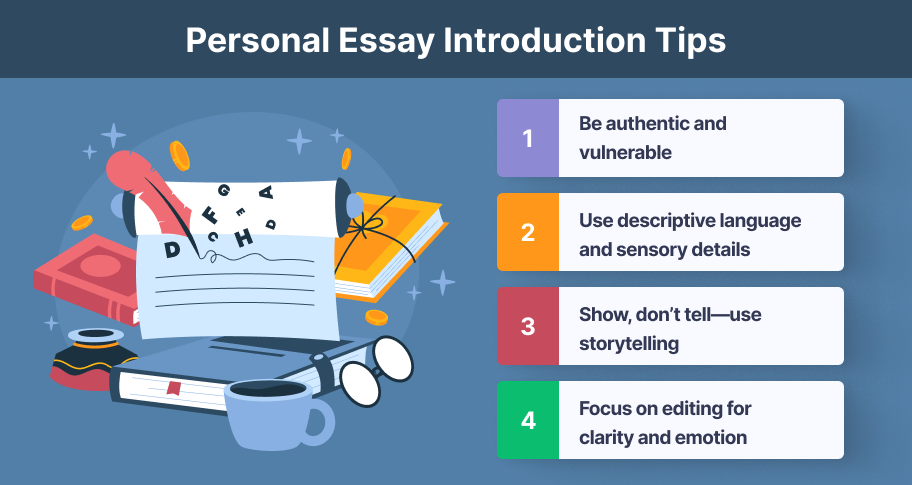
Developing the Body of the Essay
The body of a personal essay is where the writer gets into the personal experiences and considerations that he wishes to share. The body should be organized logically, but the writer is free to use anecdotes and vivid reflections as he sees fit to create an engaging narrative.
The pacing of the essay is important: it should be balanced between reflection and storytelling. You want the essay to emotionally resonate while also speaking to the mind with insight and learning. Each section should focus on an aspect or moment of the story until, gradually, the essay’s deeper meaning is revealed.
If you can foreshadow the full meaning or point in your introduction, even better.
Writing a Strong Conclusion
A well-crafted conclusion leaves a lasting impression. You can summarize the main points, but it’s also a good place to reflect more broadly on the deeper meaning of what you’ve written about. So, instead of restating what has already been said, go for a conclusion that goes deeper still, to reveal an impressive final thought that ties everything together. Personal essays often end on a note of ultimate reflection.
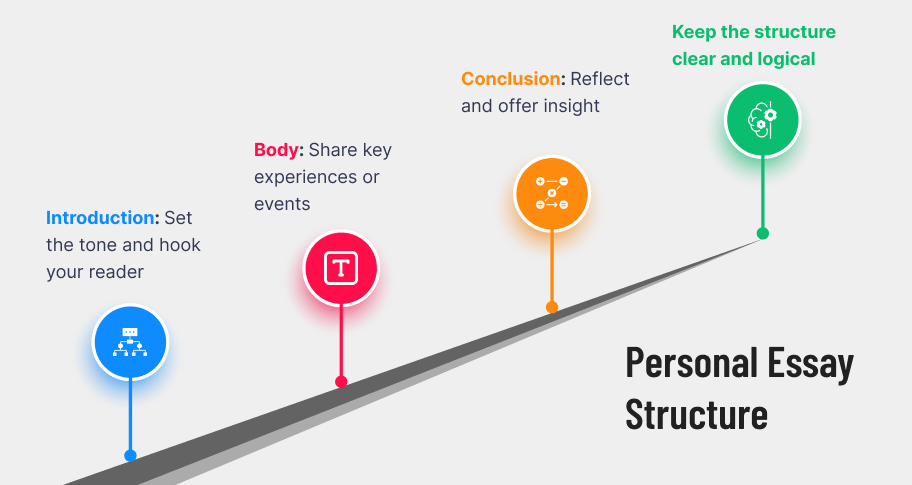
Personal Essay Writing Tips
Be Authentic and Vulnerable
One of the most important aspects of a personal essay is its authenticity. Readers connect with genuine, honest experiences, which is why you have to be truthful in your writing. Sharing personal thoughts, emotions, real experiences, worries, concerns, and even insecurities—all of it makes it easier for the reader to relate to you. Writing with vulnerability means being open about your feelings and reflections, even if they make you uncomfortable.
Here’s a tip: balance vulnerability with intention, so that the shared details serve the essay’s ultimate purpose. To be more authentic, avoid trying to impress the reader; instead, focus on simply being sincere and true. No need to apologize—just convey.
Use Descriptive Language and Sensory Details
To create a vivid and engaging personal essay, use descriptive language and sensory details that bring your experiences to life. Show, don’t just tell—describe how things looked, smelled, felt, and sounded. This is how your reader gets absorbed into the writing.
For example, instead of saying “I was nervous,” actually describe the sensation of nervousness: “My hands trembled, my flesh tingled, a cold sweat broke out all over me, and my heart flopped twice in my chest.”
But remember: try to strike a balance between detail and clarity. Overloading your essay with excessive descriptions can bog it down. Too little detail can leave the reader disengaged. Focus on using precise, exciting imagery to improve the narrative when it is most needed.
Editing and Revising Your Personal Essay
Editing and revising are always going to be helpful when it comes to improving your personal essay. After writing the first draft, step away for a bit and come back later with fresh eyes. Read it again and note any areas that could use clarification or expansion. Next, check for common mistakes like awkward phrasing or over repetition.
Be careful, too, not to lose your unique personal voice during the editing process. Avoid the temptation to over-edit, as this can make the essay sound forced or mechanical. When in doubt, have someone else read your essay to offer feedback.
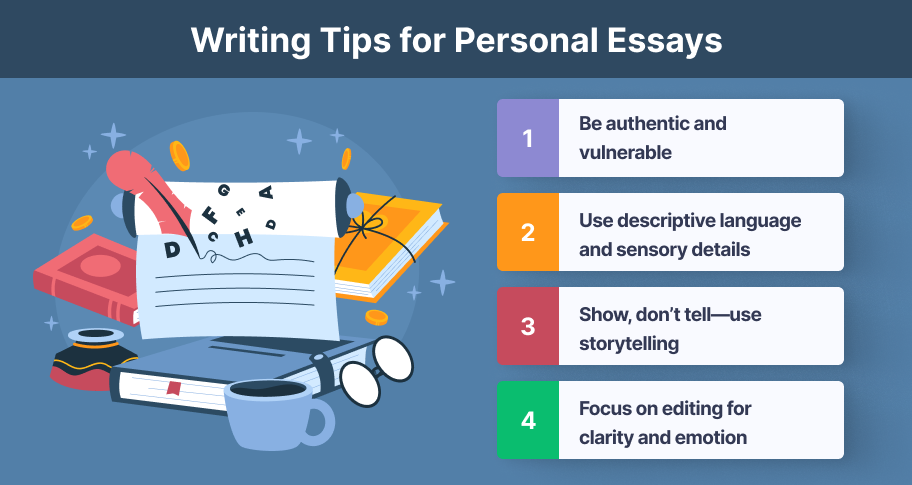
Personal Essay Topics & Essay Prompts
Finding Inspiration for Your Personal Essay
When writing a personal essay, finding the right topic will help you to more easily create a compelling narrative. Common themes often revolve around pivotal life-changing moments that shaped who you are. It will be different for everyone—but just think about who you are and why—what made you that way?
You can look at life-changing moments, relationships, personal growth, achieving personal milestones, difficult decisions you made. Think about family, friends, mentors—how they’ve influenced your development. Think about how experiences have helped strengthen you, or moments of self-discovery that led to deeper understanding of your identity and beliefs.
Personal Essay Topics
High School Topics
- A Challenge I Overcame
Reflect on a difficult situation in your life and how you grew from it. - My Most Memorable High School Experience
Write about a specific event during high school that had a significant impact on you. - How a Teacher Changed My Perspective
Discuss how a teacher or mentor influenced your views on education or life. - The Impact of Extracurricular Activities
Share how involvement in a sport, club, or activity has shaped your high school experience. - A Time I Failed and What I Learned
Write about a failure that taught you an important lesson about perseverance. - How My Friends Have Shaped Who I Am
Explore how your friendships during high school have influenced your character. - The Importance of Balancing Academics and Personal Life
Discuss the challenges of managing schoolwork with social and personal activities. - A Time I Stood Up for What I Believe In
Share a story about standing up for your values or beliefs in a difficult situation. - My Biggest High School Regret
Reflect on something you wish you had done differently during high school. - How I Prepare for Life After High School
Write about how you are preparing for the transition from high school to college or the workforce.
College Topics
- The First Time I Felt Independent
Describe the moment you first experienced real independence, such as moving to college or making an important life decision. - A College Course That Changed My Life
Write about a class that expanded your worldview or shaped your future goals. - Balancing School and Life
Reflect on how you’ve managed the responsibilities of academics and personal life in college. - A Time I Took a Risk and Succeeded
Share a story about a time you took a big risk and what the outcome taught you. - How My College Major Has Shaped My Identity
Explore how your chosen field of study has influenced who you are becoming. - The Best Advice I Ever Received in College
Write about a piece of advice that helped you navigate college life. - How My Hometown Shaped Who I Am Today
Reflect on how your upbringing or hometown influenced your college experience. - A College Internship That Changed My Perspective
Describe how a work experience or internship impacted your career goals. - Dealing with Homesickness in College
Share your experience of missing home and how you overcame it. - How College Friendships Have Helped Me Grow
Write about how friendships in college have helped you grow personally or academically.
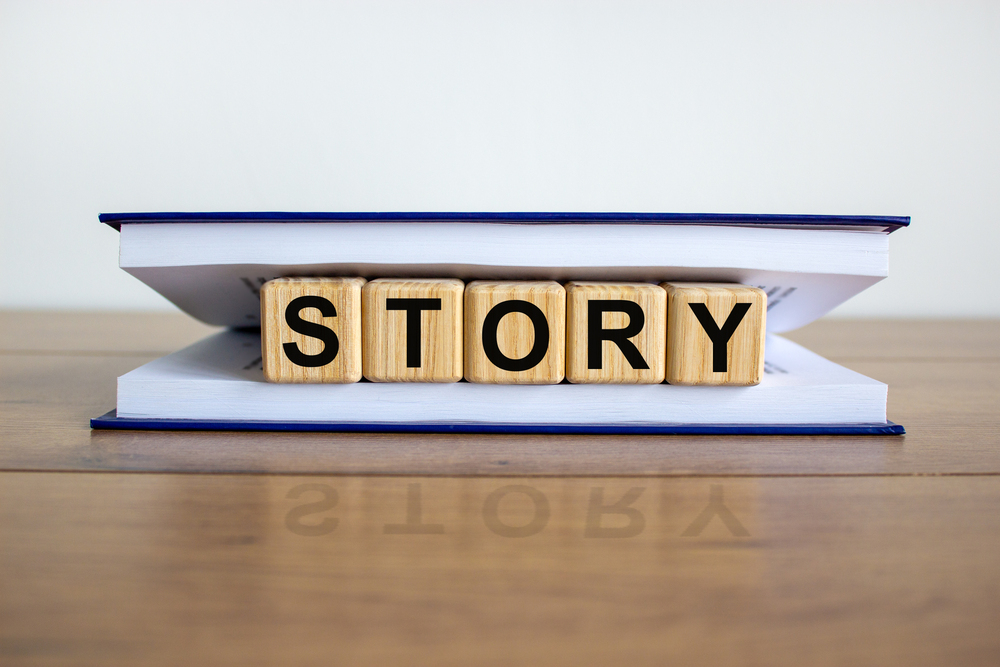
Middle School Topics
- My First Best Friend
Share a story about your first close friendship and what it taught you about relationships. - A Time I Helped Someone
Describe a moment when you lent a helping hand to someone, and how it made you feel. - The Most Exciting Day of My Life
Write about a day that stands out in your memory as one of the happiest or most thrilling experiences. - My Favorite Hobby and Why I Love It
Write about a hobby or activity you enjoy and why it’s important to you. - What I Want to Be When I Grow Up
Describe your dream job or future career and why it appeals to you. - A Family Tradition That Means a Lot to Me
Write about a special family tradition and why it’s important to you. - How I Felt on My First Day of Middle School
Reflect on the emotions and experiences of your first day in middle school. - A Time I Made a New Friend
Share a story about how you made a new friend and what it taught you about building relationships. - My Favorite School Subject
Write about the subject you enjoy the most in school and why. - How I Overcame My Biggest Fear
Describe a time when you faced a fear and how it helped you grow.
Unique Topics
- A Mistake That Turned Into a Valuable Lesson
Share a story where you made a mistake, and how it led to unexpected growth or insight. - A Conversation That Changed My Perspective
Write about a meaningful conversation that caused you to think differently about an important topic. - The Time I Experienced a Culture Shock
Describe a moment when you were exposed to a different culture or way of life and how it impacted you. - A Time I Broke the Rules
Share a story about when you broke a rule and what the consequences taught you. - My Favorite Place in the World
Write about a place that holds special meaning for you and why it’s significant. - How a Book or Movie Changed My Life
Discuss how a specific book or film impacted your way of thinking or inspired you. - A Time I Got Lost
Share a story about getting physically or emotionally lost and what you learned from finding your way. - If I Could Live in Another Time Period
Write about which historical time period you would want to live in and why. - A Skill I Taught Myself
Describe a time when you learned something on your own and how it shaped your confidence or abilities. - The Most Unexpected Lesson I Learned from a Stranger
Share a story about learning something valuable from someone you didn’t know well.
Sample Prompts for Personal Essays
If you’re struggling to come up with an idea, here are some personal essay topic ideas and essay prompts for personal writing to get you started:
- Write about a moment when you had to make a difficult decision. What was at stake, and how did it change you?
- Describe a time when you experienced failure. How did you respond, and what did you learn from the experience?
- Reflect on a relationship that has deeply impacted your life. What did it teach you about life, yourself, or others?
- Share a story about a time when you stepped outside of your comfort zone. What fears did you overcome, and what did you gain?
- Write about a personal achievement that made you feel proud. What steps did you take to get there, and why does it matter to you?
- Discuss a moment of self-discovery that changed the way you view the world or yourself.
- Describe a significant challenge or hardship you’ve faced and how it shaped your character.
- Reflect on a cultural or family tradition that holds personal meaning for you.
- Write about a time when you had to stand up for something you believed in. What motivated you, and what was the outcome?
- Share a memory that brings you joy and explain why it’s important to you.
- Write about a moment when you learned a hard truth about yourself or someone else.
- Reflect on a time when you felt out of place or misunderstood. How did you cope, and what did it teach you?
- Share a story about a person or event that inspired you to pursue a particular path or goal.
- Discuss how a personal hobby or interest has shaped your identity.
- Write about a time when you faced a moral dilemma. How did you resolve it, and what did you learn?
View 120,000+ High Quality Essay Examples
Learn-by-example to improve your academic writing
Examples of Well-Written Personal Essays
Analysis of Famous Personal Essays
One of the most well-known personal essays is Joan Didion’s “Goodbye to All That,” where she reflects on her time in New York City. Didion’s essay is effective because of its emotional depth and objective storytelling. She blends personal reflection with sharp, sensory details. The reader lives through her experience. Didion’s honesty and vulnerability in discussing her fading love for the city help create the sensation of disenchantment—and the reader feels it completely.
Another excellent example is “The Death of a Moth” by Virginia Woolf. In this essay, Woolf transforms a seemingly mundane event—the death of a moth—into a profound reflection on life and mortality. Woolf’s ability to take a small, ordinary moment and imbue it with universal meaning is what makes her essay stand out. The essay is less about her own life and more about life in general, but it is all her in the sense of perspective. Her prose and insights, and use of symbolism, gives the reader some big themes to chew on.
Key Takeaways from Successful Personal Essays
To make a personal essay impactful, here are a few techniques to follow:
- Authenticity: Share personal stories and emotions honestly and openly.
- Vivid descriptions: Use sensory details to make the narrative come alive for the reader.
- Emotional depth: Convey your inner thoughts and feelings to create a connection with the audience.
- Universal themes: Relate personal experiences to broader, more relatable human experiences.
- Reflection: Go beyond storytelling by offering insights or lessons learned.
- Symbolism and imagery: Elevate ordinary moments into meaningful reflections by using literary devices.
How to Get Feedback on Your Personal Essay
The Importance of Peer Review
Receiving feedback can help with refining your personal essay. Peer review can give you new perspectives on your writing, help identify unclear sections, and allow you to see what you didn’t see before. Constructive criticism from others can give you an idea of what your audience might be thinking. When seeking feedback, be open-minded and accept critiques as opportunities for growth. Not every suggestion needs to be followed—after all, it’s your essay. But focus on the suggestions that improve clarity, emotional impact, and narrative flow, and don’t be afraid to make revisions.
Online Tools & Writing Communities
There are numerous online platforms where you can share your work and receive valuable feedback. Writing forums like Reddit’s r/writing or Scribophile are spaces where writers can exchange critiques. Social media groups dedicated to writing are also great places to get input from fellow writers. So are structured writing workshops, like those offered by Writer’s Digest or The Write Life. These platforms help you to connect with a community of writers. With them you’ll have a chance to get personalized peer review for essays and online writing feedback.
Common Mistakes to Avoid in Personal Essays
Overloading with Unnecessary Details
One common mistake in personal essays is including too many irrelevant or trivial details that detract from the core message. Descriptions are important, but don’t overload the essay with unnecessary information. Describe what needs to be described to communicate the themes. Don’t overwhelm the reader and dilute the emotional impact by focusing on insignificant details. Give, instead, details that add to the story and contribute to the overall idea. Every sentence should serve a purpose—if it doesn’t add value or further the narrative, it’s best to leave it out.
Lack of Focus or Clear Theme
Another mistake is writing without a clear theme or losing focus as the essay progresses. A personal essay should revolve around a specific idea, experience, reflection, or lesson. When the essay lacks focus, it just ends up feeling disjointed and confused. To avoid this, establish a central theme early in the essay and stick to it; make sure every detail somehow relates back to it so as to deepen its meaning or enlarge it somehow. Every story, anecdote, reflection, and detail should tie back to that theme. A strong narrative thread will make the essay more engaging and meaningful.
Over-Editing or Losing Personal Voice
Be careful to avoid over-editing, which can result in an essay that feels too polished and impersonal. In an effort to perfect grammar or structure, writers sometimes lose their own unique voice and emotional authenticity. Avoid editing to the point where the essay becomes mechanical—try to keep the raw, honest tone that makes personal essays compelling. Trust your voice and trust your gut and let it shine through.
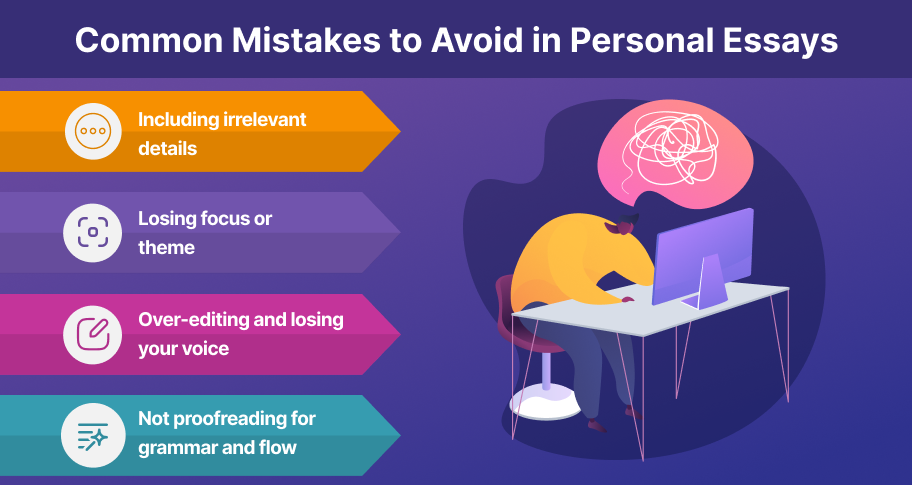
Final Checklist Before Submitting Your Personal Essay
Editing and Proofreading Tips
Before submitting your personal essay, run through this quick checklist:
- Grammar and spelling: Correct any grammatical errors and typos to ensure professionalism.
- Flow and structure: Ensure that your essay follows a clear, logical progression, with smooth transitions between paragraphs.
- Clarity: Make sure your main points are easily understood and that your theme remains focused throughout.
- Emotional impact: Review whether the essay evokes the intended emotions and resonates with readers.
- Personal voice: Ensure that your unique voice and perspective shine through without sounding overly polished or formal.
Confidence in Sharing Your Story
As you prepare to submit your essay, remember that your story is uniquely yours. Embrace your experiences and insights with pride. Your personal essay is a reflection of you. Don’t apologize for it. Confidence in your writing comes from understanding that no one else can tell your story the way you can. Trust your voice and be proud of your work!
Conclusion
Writing a personal essay is a powerful way to express your experiences, thoughts, insights, lessons learned, feelings, and memories. You can structure it however you want—but be consistent. The traditional way is to start with an engaging introduction, followed up by a well-organized body, and finished off with a reflective conclusion. Use that approach and you have the backbone for a compelling narrative.
Remember to maintain authenticity by writing with honesty. Let yourself be vulnerable—it’s okay and expected in a personal essay. Use descriptive language to bring your story to life—but don’t overdo it. Take time to revise carefully. Polish your essay, but don’t kill it with too much care. Let your personal voice live and shine in your words and ideas. This is, after all, a reflection of you and who you are and what you’ve seen and where you’ve been!
Need additional help? Download our personal essay writing worksheet to help get you started!

